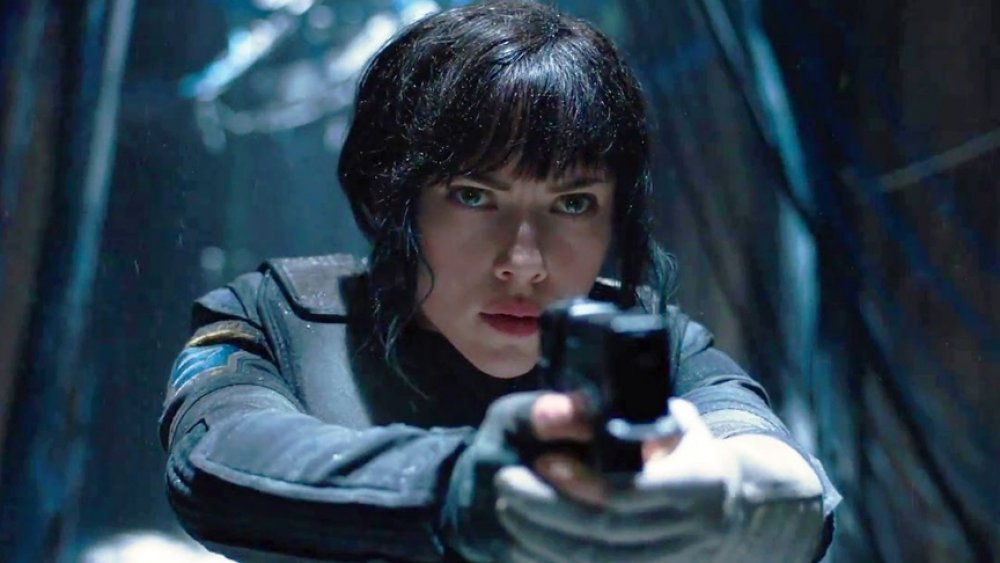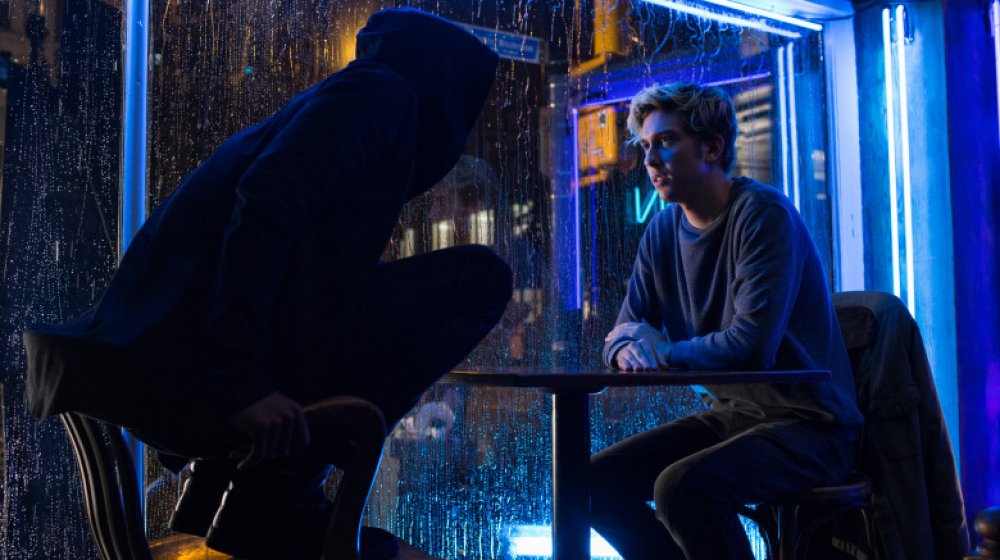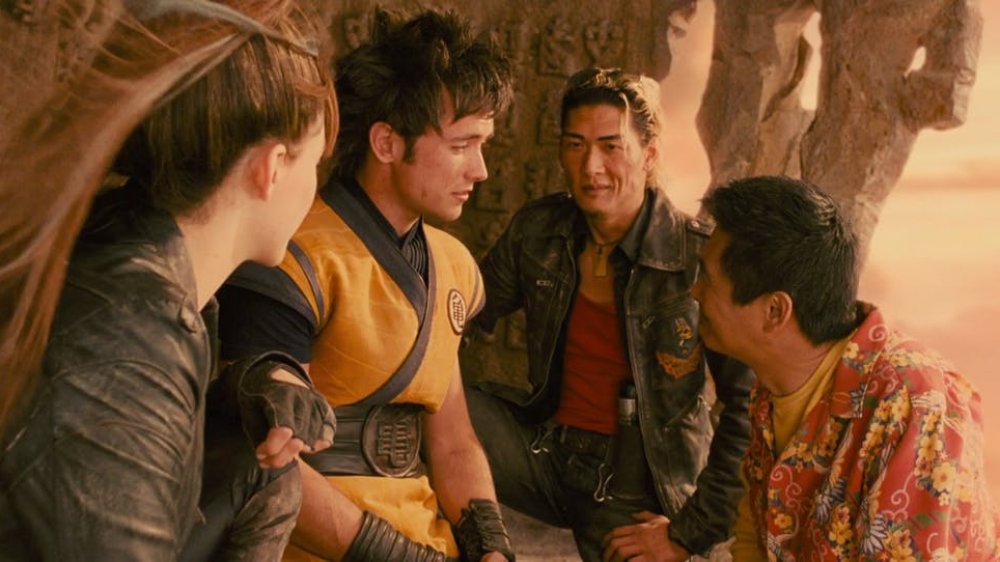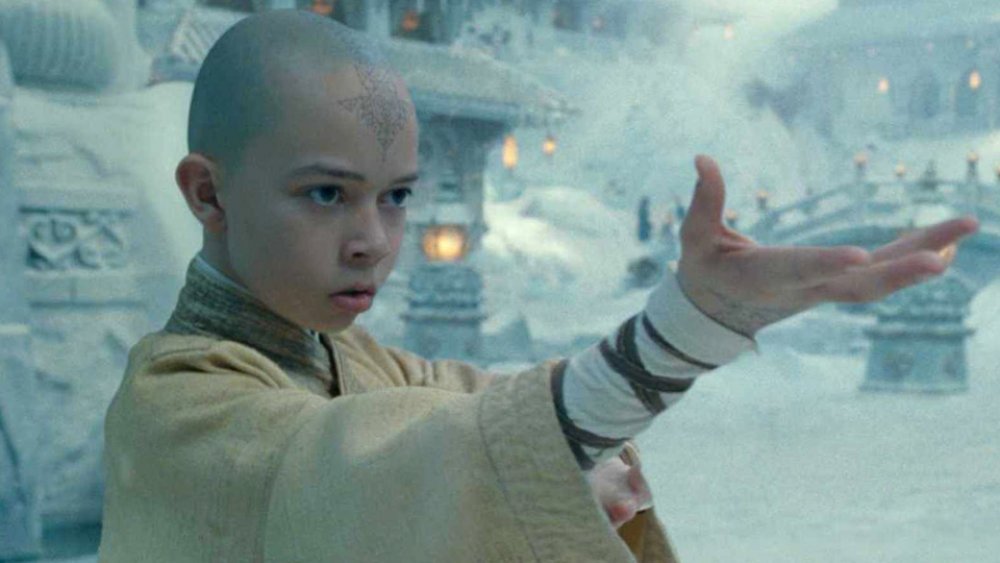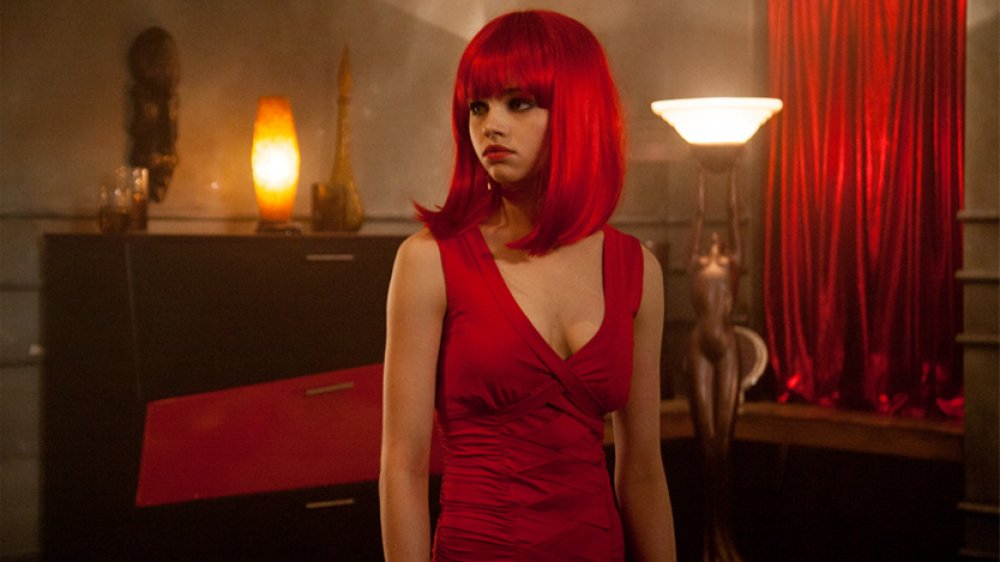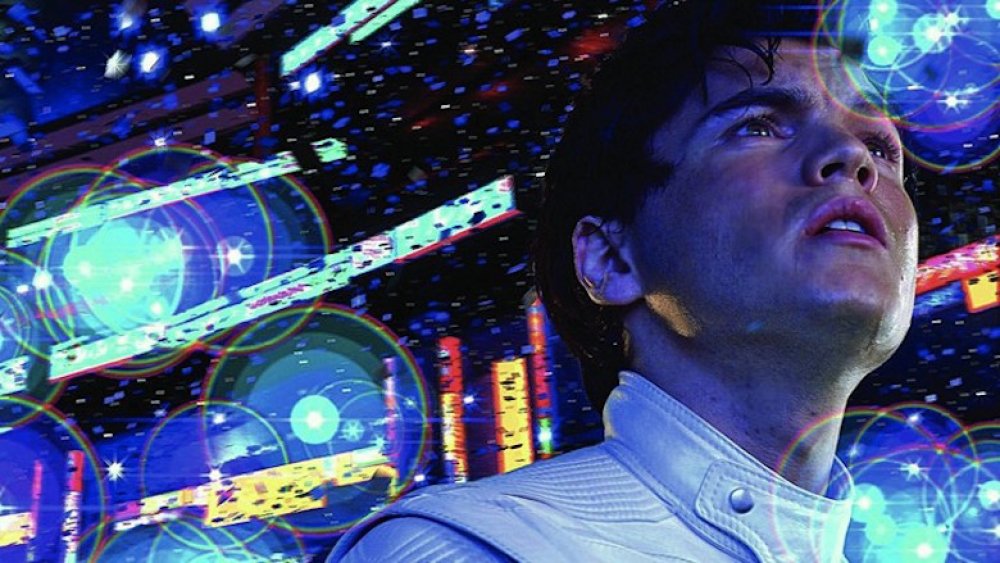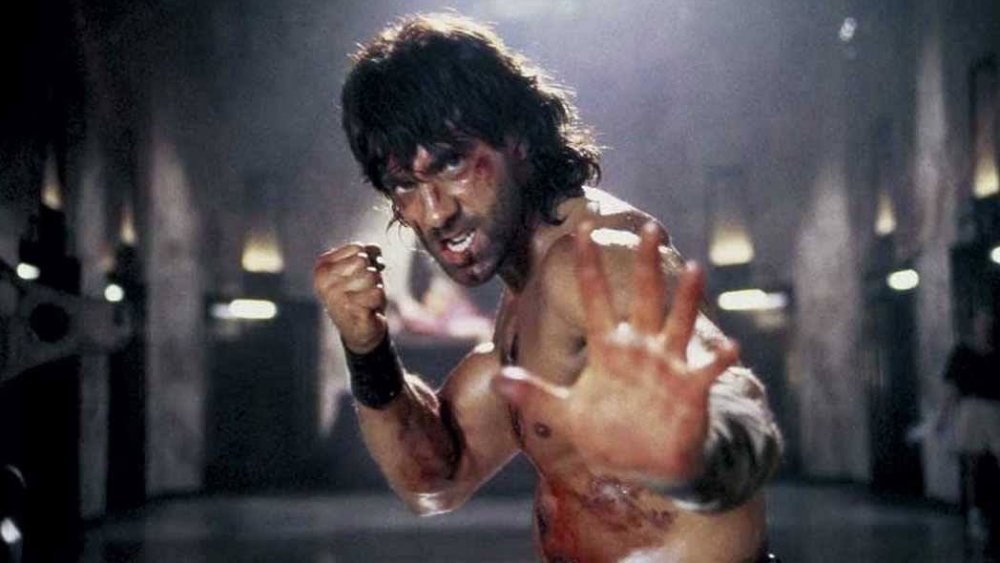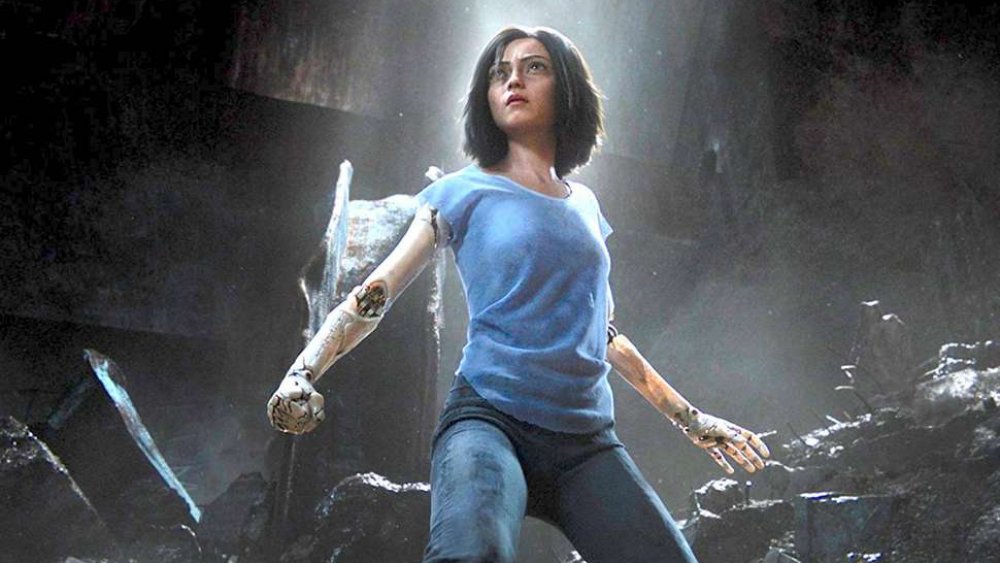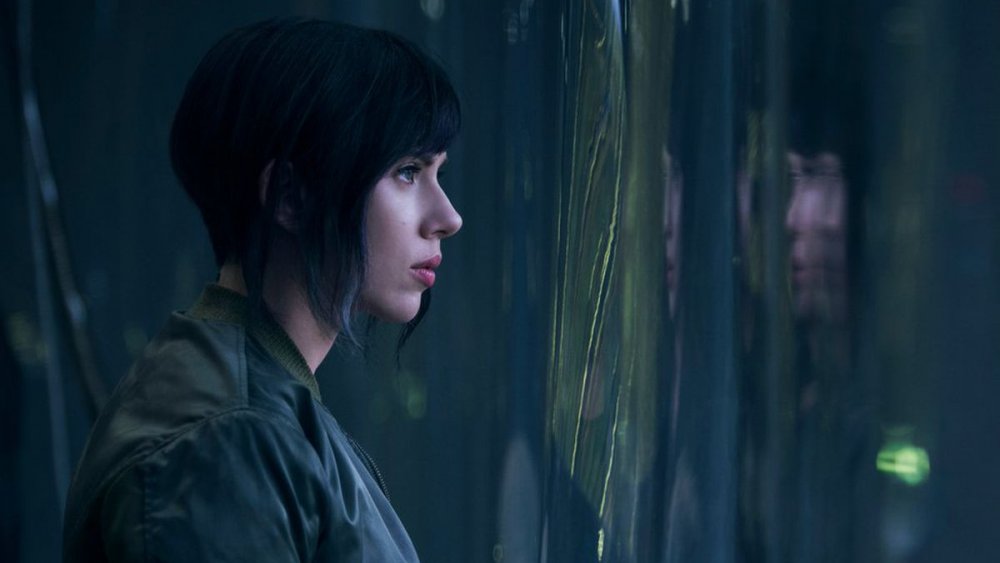The Worst Hollywood Adaptations Of Anime
While Hollywood can't seem to stay away from the draw of anime shows and movies, they also can't seem to cobble together any decent adaptations. The biggest problem Hollywood seems to have in adapting anime comes down to casting. After all, anime characters are primarily Asian, and more often than not, American movies end up with white actors on the screen.
However, whitewashing isn't the only problem when it comes to adapting anime for Western audiences. Often times, Hollywood filmmakers skip over heavy themes, rely too much on over-the-top CGI, or do a major disservice to the martial arts action scenes. As a result, there are a lot of bad anime adaptations out there, but when it comes to offending fans and screwing up stories, some movies are way worse than others. So which ones take the prize for being absolutely awful? Well, from hated Netflix films to movies starring A-list actors, here are the worst Hollywood adaptations of anime.
Death Note can't live up to the anime original
How badly did Netflix's adaptation of Death Note fail? Let's count all the ways. First, it shifts the action from Japan to Seattle and casts a non-Asian as Light Nagami, whose name is anglicized to Light Turner (Nat Wolff). Seattle has a huge Asian population so it would've made total sense for the main character to remain, well, Asian. But no. Hollywood's whitewashing problem rears its racist head once again.
Second, Death Note warps the source material's nuanced plot that revolves around morality and how far people will go before their own integrity is compromised by their bad decisions. Instead, the movie veers quickly into high school romance territory with the introduction of Mia (Margaret Qualley), to whom Light reveals his powers because he has a crush on her. Major cringing here.
Then there's the dialogue, which is Hallmark tween comedy hokey. However, when the violence gets going, the film turns into a gory horror movie that's at complete odds with everything else that's been set up to that point. And among all this, Death Note also ends up being terribly boring. That alone is enough to make it one of the worst Hollywood anime adaptations of all time, especially when taking into account the dynamic source material.
Dragonball Evolution is a disastrous adaptation
While Dragonball Evolution actually cast some Asian folks in the film adaptation of the way popular anime series, the enormous missteps it made with its lead character, Goku (played by Justin Chatwin), were more than enough to spoil the film entirely. Dragonball Evolution not only whitewashes Goku, but in the process, it also erases his important Saiyan roots that are key links to explain his powers. The Saiyans were an alien race charged with protecting the universe, and this history is a big deal in the Dragonball mythology. It's almost like the movie production completely forgot who their target audience was: People who will absolutely notice when you muck up a good backstory and canon.
As Dragonball Evolution tanked, no one was surprised to later find out that the film's screenwriter, Ben Ramsey, wasn't just unfamiliar with the anime, he wasn't much of a fan even after he finally watched it. Huge shocker to nobody who suffered through the terrible plot and worse writing. Ramsey ended up publicly apologizing for the shoddy job he did, but that doesn't change the fact that Dragonball Evolution was an absolute disaster.
The Last Airbender is one of the worst movies to come out of Hollywood
M. Night Shyamalan's movies often have an incredible twist. But The Last Airbender's was revealed when this anime adaptation was released with most of the main characters being portrayed by non-Asians. As for folks of Asian descent, they were mostly relegated to playing villains (like Admiral Zhao's Aasif Mandvi) or taking up background roles to add a bit of color. With Hollywood's whitewashing of Asian characters an established thing in the industry, it's particularly disheartening when someone like Indian-American Shyamalan participates in the exclusion of people of color from stories about them on screen. Michael Le of Racebending.com (via CBC) lamented, "To take this incredibly loved children's series, and really distort not only the ethnicity of the individual characters but the message of acceptance and cultural diversity that the original series advocated, is a huge blow."
This wouldn't be the worst of The Last Airbender, either. The writing is atrocious, the acting is stilted, and the big-budget special effects are completely wasted between the two. The Last Airbender is one of the most universally hated films on Rotten Tomatoes, garnering a measly 5 percent score based on 179 scathing reviews. It's definitely one of M. Night Shyamalan's worst movies, and it took his directing and writing career years to recover from the blunder.
Kite is truly awful in every way
While Kite features a primarily non-Asian cast — including its leading lady, India Eisley — criticisms of this film land firmly in the "it simply sucks" category. Based on Yasuomi Umetsu's violent and visually striking anime series about a young female assassin who goes after rapists and other criminals, Ralph Ziman's Hollywood adaptation ends up being a huge pile of exploitative trash as it continually sexually objectifies its young anti-heroine, Kite. The original character fights against sexual exploitation of all kinds, so seeing her framed as a sex object in the movie rather than a powerful assassin is an extreme dishonor to the source material.
First reviewers of the film trashed its missteps so spectacularly and completely that Kite has an actual 0 percent rating on Rotten Tomatoes, with a mere 15 reviews that even made it to print before all the rest of the critics just decided not to watch the disaster themselves at all. Anime Kite would 100 percent approve of these actions.
Speed Racer can't compare to the cartoon
Speed Racer would be far from the only time that the Wachowski sisters of The Matrix fame would come under fire for problematic presentations of race (Cloud Atlas, anyone?), but it was their first foray into Hollywood's particular whitewashing quagmire. Once again, an all-white cast portrays what was a Japanese family in the original anime, but the problems don't stop there. Rolling Stone really said it when they wrote, "Even the target audience of 10-year-olds might get jimmy legs sitting for a punishing 135 minutes as the Wachowskis ... projectile-vomit their cotton-candy dreams all over the big screen."
A convoluted and chaotic plot that seems to never end, as well as a constant and overwhelming barrage of images flashing before our eyes, Speed Racer is a roller coaster at super speed, but not in a good way. Even its star-studded cast — featuring Emile Hirsch, John Goodman, Susan Sarandon, and Christina Ricci — isn't enough to salvage the film, especially since they often get drowned out by the overly kinetic pace of ongoing background imagery, so they all crash and burn together. Please, somebody give this iconic cartoon a reboot and actually make it good this time.
Fist of the North Star is an embarrassment to the anime
The film adaptation of Toei Animation's popular anime series Fist of the North Star back in 1995 went straight to VHS (remember those?), which was olden days speech for, "This movie is so terrible that cinemas preemptively cancelled all the shows." While Fist of the North Star did air on HBO, this was long before virtually every household had access to the channel and premieres on the prestige network became a huge deal.
Starring Gary Daniels as Kenshiro (eye roll) and Costas Mandylor as Shin (double eye roll), this hokey action fantasy has so many hammy performances that you'd think it was pork curing day. Worse, even the martial arts choreography is dreadful and forced, an insult to the practice all together. To the film's credit, though, it did cast Japanese actress Isako Washio as the love interest, Yurio. But the credit begins and ends right there, and Fist of the North Star is definitely a movie that deserves to be forgotten.
Alita: Battle Angel does a disservice to the source material
While not technically based on an anime per se but rather the manga Gunnm by Yukito Kishiro and its subsequent original video animation, Alita: Battle Angel is a part live action, part CGI-animated adaptation of Kishiro's work. Directed by horror genre favorite Robert Rodriguez, with a screenplay co-penned by James Cameron who also produced, Alita should've been a home run, especially since Cameron used his patented Avatar programs for a similar kind of animated look.
Alita: Battle Angel is one of the only Hollywood adaptations of a Japanese story to feature a person of color in the titular role, but unfortunately in this case, the actor playing Alita, Rosa Salazar, is of Peruvian descent, not Asian. The only Asian actors in Alita: Battle Angel are extras. Deep sigh. And while the imagery in the film might be beautiful and arresting, the dialogue is filled with boatloads of exposition that end up making the plot hard to follow and accidentally obtuse. Even worse, as Salon writes, "Alita is a fascinating badass. Alita: Battle Angel fails her at every turn."
Hollywood's adaptation of Ghost in the Shell is majorly offensive
Masamune Shirow's iconic manga series Ghost in the Shell was successfully adapted into a dazzling anime film in 1995 and later into a series of TV shows of varying degrees. While these Japanese language animes ended up dubbed in English with voices of non-Asian actors, the effect isn't nearly as jarring as the casting of Scarlett Johansson as the main character, Motoko Kusanagi, in the 2017 live action film adaptation. Worse, in order to make Johansson look more Asian, the production at one point digitally altered her eyes and facial structure to suggest she's Japanese adjacent. Needless to say, they failed miserably at that, and fortunately, the filmmakers decided to scrap that idea.
Still, the outrage was so furious that at the first news of Johansson's casting in 2015 — years before the film even came out — Ghost in the Shell fans circulated a petition to re-cast the role with an actual Asian woman, of which there are many who could've fit the bill. The casting controversy aside, the movie might pay homage to the source materials aesthetically, but it only tackles their meatier subtext about humanity and technology on the most surface of levels. This alone makes Ghost in the Shell a terrible Hollywood anime adaptation.
